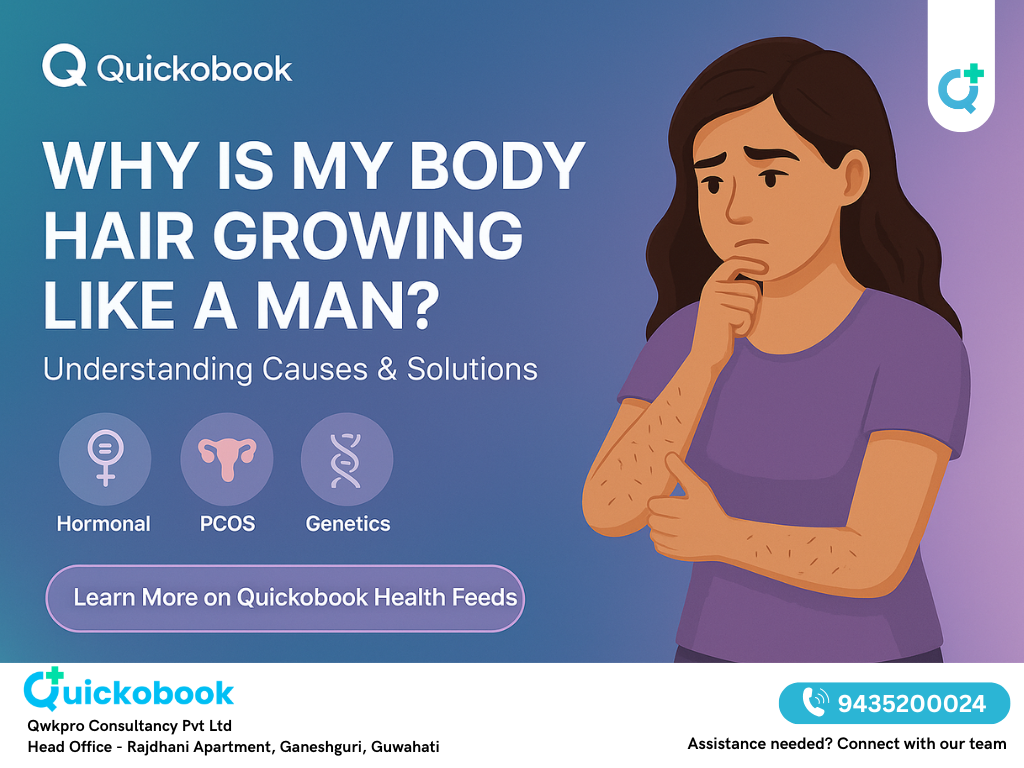Introduction
Are you noticing unusual hair growth on your face, chest, or back? Many women in India struggle with this concern, often asking, “Why is my body hair growing like a man?” This condition is medically known as hirsutism and is commonly linked to PCOS (Polycystic Ovary Syndrome), hormonal imbalances, or other underlying health conditions. It can cause emotional distress, affect self-confidence, and sometimes point to deeper medical issues.
The good news is that effective treatments are available. With the help of a gynaecologist and a Quickobook doctor consultation, you can get the right diagnosis and treatment plan. This blog will give you an in-depth understanding of the causes, symptoms, treatments, lifestyle strategies, and prevention methods for excessive body hair in women, covering over 4500 words for maximum detail.
What is Hirsutism?
Hirsutism refers to excessive, male-pattern hair growth in women. This includes thick, coarse hair on the face, chest, abdomen, or back. Unlike normal fine hair, hirsutism hair is darker and denser. While mild hair growth is common, especially in South Asian women due to genetics, sudden or severe changes often require medical attention.
Causes of Excessive Hair Growth in Women
Excessive body hair growth in women may have multiple underlying causes. The most important ones include:
1. PCOS (Polycystic Ovary Syndrome)
- PCOS is the most common cause of excessive hair growth in women. It is a hormonal disorder where the ovaries produce higher levels of androgens (male hormones).
- These hormones stimulate male-pattern hair growth, irregular periods, acne, and weight gain.
- PCOS affects nearly 1 in 5 Indian women of reproductive age, making it one of the biggest health challenges today.
2. Hormonal Imbalance
- Conditions like thyroid disease, adrenal disorders, or high prolactin levels can disturb the balance of estrogen and androgens.
- An excess of testosterone in women directly leads to male-like hair growth.
3. Genetics & Ethnicity
- Family history plays a huge role in hair growth. Women of South Asian, Middle Eastern, or Mediterranean origin naturally tend to have more visible body hair than women of other ethnicities.
4. Obesity & Insulin Resistance
- Being overweight increases insulin resistance, which worsens PCOS symptoms.
- High insulin stimulates the ovaries to make more testosterone, leading to excess body hair.
5. Medications
- Certain drugs can trigger hirsutism, including:
- Steroids
- Testosterone-containing medicines
- Some epilepsy medications
- Minoxidil (for hair growth)
6. Rare Causes
- Adrenal or ovarian tumors
- Cushing’s syndrome (high cortisol levels)
- Congenital adrenal hyperplasia (CAH)
Symptoms That May Accompany Excessive Hair Growth
Along with unwanted hair, women may notice:
- Irregular or missed periods
- Severe acne and oily skin
- Weight gain, especially around the waist
- Thinning scalp hair or bald patches
- Dark skin patches (acanthosis nigricans)
- Fertility issues
- Mood swings or depression
If these symptoms are present, consult a Gynaecologist for proper diagnosis.
Diagnosis
To diagnose the cause of hirsutism, doctors may recommend:
- Medical history & physical exam – Checking hair distribution, weight, skin changes.
- Blood tests – Testosterone, LH, FSH, thyroid, prolactin, insulin.
- Ultrasound scan – To look for PCOS.
- CT/MRI scans – Rarely, if adrenal or ovarian tumors are suspected.
Treatment Options
1. Medical Treatments
- Oral contraceptive pills (OCPs): Balance hormones and regulate periods.
- Anti-androgen medicines: Spironolactone and finasteride reduce male hormone effects.
- Metformin: Improves insulin sensitivity in women with PCOS.
2. Hair Removal Methods
- Temporary options: Waxing, threading, shaving, depilatory creams.
- Permanent options:
- Laser hair removal – Effective but requires multiple sessions.
- Electrolysis – Destroys hair follicles individually, permanent but time-consuming.
3. Lifestyle Management
- Weight loss: Even 5–10% reduction in body weight helps.
- Balanced diet: Focus on low GI foods, avoid junk food.
- Exercise: At least 30 minutes daily.
- Stress reduction: Yoga, meditation, and adequate sleep.
READ ALSO: How To Manage Period Cramps Without Medicine?
Prevention & Lifestyle Tips
While not all cases of hirsutism can be prevented, lifestyle changes make a huge difference:
- Maintain a healthy body weight
- Exercise regularly
- Avoid sugary foods and refined carbs
- Practice stress management
- Get regular health check-ups
When to See a Gynaecologist
You should consult a doctor if:
- Hair growth is sudden, severe, or spreading rapidly
- Your periods are irregular or stopped
- You are struggling to conceive
- You have acne, weight gain, or hair thinning
- You feel emotionally distressed due to excess hair
Quickobook makes it simple to connect with a gynaecologist near you for a timely diagnosis.
Risks & Complications if Untreated
If left untreated, hirsutism may cause:
- Infertility due to PCOS
- Type 2 diabetes from insulin resistance
- Heart disease due to metabolic changes
- Mental health issues like anxiety, depression, and poor self-esteem
Conclusion
Excessive male-like hair growth in women is not just a cosmetic concern—it is often a sign of PCOS, hormonal imbalance, or underlying health conditions. Timely consultation with a gynaecologist is the key to early diagnosis and better management. With a combination of lifestyle changes, medicines, and safe cosmetic treatments, women can manage hirsutism effectively.
???? Book a Quickobook doctor consultation today and take control of your health with expert gynaecologists.
FAQs (50 Expert Answers)
Q1. What is hirsutism?
A. Hirsutism is excessive, male-pattern hair growth in women, usually due to high androgen levels.
Q2. Can PCOS cause facial hair?
A. Yes, PCOS increases male hormones, leading to facial and body hair growth.
Q3. Is body hair growth in women always abnormal?
A. No, some fine hair is normal. Abnormal growth is thick, coarse, and in male-pattern areas.
Q4. Which doctor should I consult for excessive hair growth?
A. A gynaecologist or endocrinologist can help diagnose and treat the condition.
Q5. Can thyroid issues cause excess hair?
A. Yes, thyroid imbalance may contribute to abnormal hair growth.
Q6. Does obesity worsen hirsutism?
A. Yes, excess weight raises insulin resistance and androgen levels.
Q7. Can stress increase hair growth?
A. Stress affects hormones and can worsen PCOS symptoms.
Q8. What tests are done for hirsutism?
A. Blood tests for hormones, ultrasound of ovaries, and sometimes adrenal scans.
Q9. Can laser hair removal cure hirsutism?
A. No, it removes hair but does not cure hormonal imbalance.
Q10. Is hirsutism genetic?
A. Yes, family history and ethnicity play a role.
Q11. Can hirsutism affect fertility?
A. Yes, especially if linked to PCOS.
Q12. Does waxing worsen hair growth?
A. No, waxing does not change hair thickness or growth rate.
Q13. Are home remedies effective?
A. Some may slow hair growth slightly but are not a permanent solution.
Q14. Can hirsutism be cured?
A. It can be managed but not always fully cured.
Q15. Do all women with PCOS have hirsutism?
A. No, but it is a common symptom.
Q16. What is the Ferriman-Gallwey score?
A. A medical scale used to measure hair growth severity.
Q17. Is irregular menstruation linked to excess hair?
A. Yes, both are signs of hormonal imbalance.
Q18. Can diet improve hirsutism?
A. A healthy diet helps control PCOS and hormone levels.
Q19. Does hirsutism affect teenagers?
A. Yes, PCOS can start during adolescence.
Q20. Can hirsutism cause depression?
A. Yes, due to low self-esteem and body image concerns.
Q21. Is medication necessary for all cases?
A. Not always—mild cases may be managed with lifestyle changes.
Q22. Does insulin resistance cause hair growth?
A. Yes, it triggers high androgen levels in PCOS.
Q23. Can pregnancy improve hirsutism?
A. Hormonal shifts may temporarily reduce or worsen it.
Q24. Is hair thinning on the scalp linked to hirsutism?
A. Yes, high androgens can cause female-pattern hair loss.
Q25. Can metformin reduce hair growth?
A. Indirectly, by improving insulin sensitivity in PCOS.
Q26. Is laser hair removal safe for PCOS patients?
A. Yes, but multiple sessions are needed.
Q27. Can Ayurveda help with hirsutism?
A. Some herbal remedies may support balance, but consult a doctor.
Q28. What is electrolysis for hair removal?
A. A permanent method that destroys hair follicles individually.
Q29. Can hirsutism be prevented?
A. Not always, but lifestyle management reduces severity.
Q30. Can I get rid of hirsutism naturally?
A. Lifestyle changes help, but full removal needs medical treatment.
Q31. Can PCOS be cured permanently?
A. No, but symptoms can be controlled.
Q32. Do birth control pills stop hair growth?
A. They reduce androgen levels, which helps control hair.
Q33. Is hirsutism common in India?
A. Yes, especially due to high rates of PCOS.
Q34. Can losing 5-10% weight improve symptoms?
A. Yes, even small weight loss helps hormone balance.
Q35. Does family history increase risk?
A. Yes, genetic predisposition is a factor.
Q36. Can excessive body hair be cancer-related?
A. Rarely, but ovarian or adrenal tumors can cause it.
Q37. Is hirsutism the same as hypertrichosis?
A. No, hypertrichosis is overall body hair growth, not male-pattern.
Q38. Can oily skin be a sign of PCOS?
A. Yes, due to high androgens.
Q39. Does menopause reduce hirsutism?
A. Sometimes, but it may persist.
Q40. Can yoga help PCOS-related hair growth?
A. Yes, yoga reduces stress and improves hormone balance.
Q41. Does shaving increase thickness of hair?
A. No, it only makes hair appear blunt.
Q42. Can fertility treatment help women with PCOS and hirsutism?
A. Yes, fertility specialists can help manage both.
Q43. Is dark skin patching a sign of PCOS?
A. Yes, acanthosis nigricans indicates insulin resistance.
Q44. Can alcohol worsen hirsutism?
A. Excess alcohol affects hormones and weight.
Q45. Can turmeric reduce hair growth?
A. It may slow growth slightly, but not permanently.
Q46. Are there blood tests for PCOS?
A. Yes, including LH, FSH, testosterone, insulin, and thyroid.
Q47. Can children develop hirsutism?
A. Rare, but possible if hormonal disorders are present.
Q48. Can sleep affect PCOS symptoms?
A. Yes, poor sleep worsens hormone imbalance.
Q49. Should I see a gynaecologist for mild hair growth?
A. If it causes distress or other symptoms, yes.
Q50. How can Quickobook help with hirsutism?
A. Quickobook connects you with gynaecologists for expert diagnosis and treatment.










Comments (0)
No comments yet. Be the first to share your thoughts!
Leave a Comment